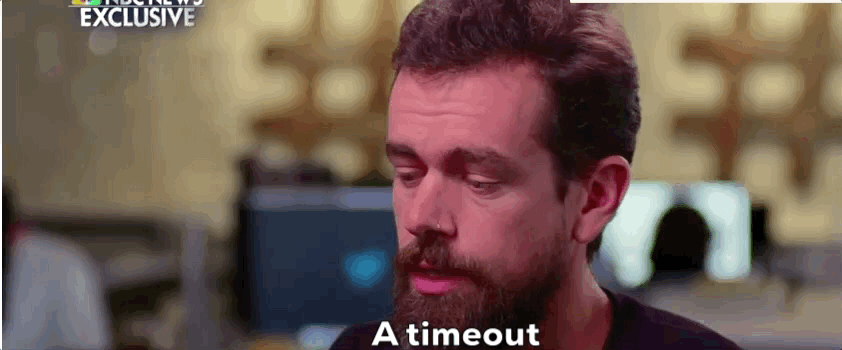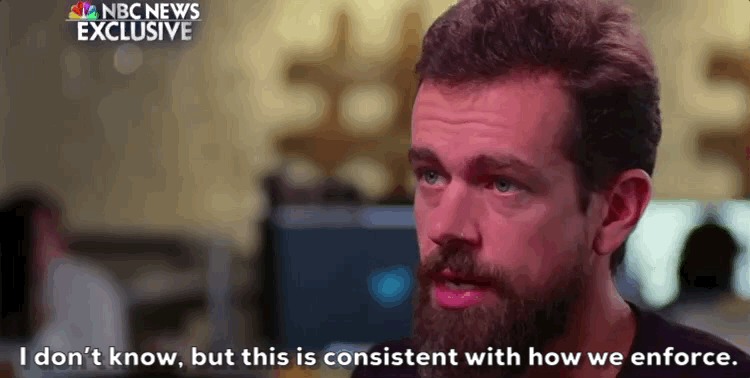On Wednesday, Twitter enacted the softest of punishments against Alex Jones and his website, Infowars, after months of outrage at the social network’s inaction. Jones has used the internet and his radio show for years to spread conspiracy theories and dangerous hoaxes, inciting abhorrent behavior and even violence. Both his personal accounts and the Infowars pages have built robust followings through social media, and only recently has mounting criticism pushed the platforms hosting his rhetoric to respond.
Twitter, following Facebook, YouTube, and others, was the last network to take action against Jones, and that action is tepid: Twitter placed Jones in a “timeout,” meaning he can’t tweet or retweet. He can read tweets and send direct messages to his followers. This temporary suspension will last one week.
Twitter CEO Jack Dorsey, in a nose ring and oversized black T-shirt, sat down with Lester Holt on the Wednesday NBC Nightly News to discuss previous moments when his company remained inert, including when Jones used Twitter to call shooting survivors at Marjory Stoneman Douglas High School in Parkland, Florida, “crisis actors” and to spread his theory that the Sandy Hook Elementary School shootings in Newtown, Connecticut, were a hoax. More recently, Jones took to Twitter to threaten journalists. Exhausted and contrite, Dorsey explained to Holt that the most important thing to the company is enforcing its rules consistently. The statement sounded strange considering Twitter users are threatened and harassed moment to moment.
Dorsey’s interview and the suspension of Jones are the result of public frustration that has been mounting for months. Jones and Infowars are a huge proponent of dangerous conspiracy theories and hateful discourse, and they are at the center of the misinformation storm. For months, news reports focused on their repeated attacks and falsehoods while digital platforms that disseminated them attempted to defend their actions. This timeline explains how Dorsey came to suspend Jones and sit down with Holt to address his company’s failings.
February 23
YouTube issues The Alex Jones Channel its first strike for publishing a video accusing Douglas High School shooting survivor David Hogg of being a crisis actor — someone trained to act like a shooting victim in order to carry out a hoax. The pulled video was titled “David Hogg Can’t Remember His Lines In TV Interview.”
February 27
After publishing an Infowars video claiming that some of the Parkland survivors were crisis actors and describing other conspiracy theories surrounding the shooting, YouTube says Jones’s YouTube channels are one strike away from being pulled.
March 1
The YouTube account belonging to Jerome Corsi, Infowars’ D.C. bureau chief, is taken down for bullying and harassment. YouTube says Corsi violated its three strikes policy. A first “community guidelines” strike is more or less a notice, but in some cases it may limit an account to livestreaming only for as long as YouTube deems necessary; a second strike means an account is unable to post anything for two weeks. A third strike terminates an account. Strikes expire after three months, so an account must receive all three within three months to get the ultimate penalty. Corsi’s account was restored later the same day.
March 4
YouTube tells CBS News that while it will not take down Jones’s channels, advertisers are requesting their ads not be shown on his videos. Jones claims YouTube told him all of his videos were being removed; YouTube denies this.
April 23
YouTube pulls a video from Media Matters, a liberal media watchdog, that details Jones’s conspiracy theories. The platform is quickly criticized for doing this while failing to censor Jones’s account. After the backlash, YouTube put the video back up.
June 16
Amazon is criticized for distributing conspiracy theory documentaries, including those from Jones, on its Prime video service. Amazon does not comment; many of Jones’s documentaries are still available on the platform.
July 11
During a meeting with media outlets to outline and publicize its fight against “fake news,” Facebook is criticized for continuing to host Alex Jones and Infowars on its platform. Head of News Feed John Hegeman defends Facebook’s decision, saying, “I guess just for being false, that doesn’t violate the community standards. I think part of the fundamental thing here is that we created Facebook to be a place where different people can have a voice. And different publishers have very different points of view.” After some reporters critique this answer, Facebook takes to Twitter to respond.
https://twitter.com/oliverdarcy/status/1017242469308788741
July 18
In a Recode interview, Kara Swisher asks Facebook CEO Mark Zuckerberg why posts about Jones’s Sandy Hook shooting hoax theory are on the platform on his personal and Infowars pages. Zuckerberg says that because Jones isn’t directly confronting victims, his posts can stay up. “Going to someone who is a victim of Sandy Hook and telling them, ‘Hey, no, you’re a liar’ — that is harassment, and we actually will take that down,” Zuckerberg says.
In the same interview, Zuckerberg addresses Facebook users who question the Holocaust by saying that though he finds them “abhorrent,” there are “things that different people get wrong.” He said banning pages like Infowars and those of Holocaust deniers is “too extreme.” The negative reaction to Zuckerberg’s comments comes swiftly, and the outrage over Facebook’s decision to harbor Jones and Infowars heightens. Zuckerberg later backpedals and says he finds Holocaust denial “deeply offensive” and that he didn’t mean to defend those who believe it.
July 23
Jones threatens special counsel Robert Mueller in a YouTube video. In addition to making a hand gesture insinuating he would shoot Mueller, Jones also accuses him of helping cover up child abuse. Jones ends up pulling the video. He also posts the video to Facebook; Facebook says it is not a credible threat of violence and it remains up.
July 25
YouTube removes various Jones videos that contain hate speech against Muslims and transgender people, as well as one depicting child endangerment, and the channel is subsequently given another “strike.” While this would have been the channel’s third strike, YouTube’s policy states that strikes expire after three months, so it did not ban the channel completely. The four videos removed were “bundled” together, meaning Jones receives only one strike for the incident, and his channel remains live. The offending videos do not include the one Jones pulled in which he threatened Mueller.
On the same day, Facebook is pressed by reporters at the Television Critics Association press tour about why it allows Jones and Infowars to publish content. “I find Infowars absolutely atrocious,” Facebook vice president of product Fidji Simo said. “That being said, we have the hard job of trying to find a sense of balance between freedom of expression and safety.”
July 27
Facebook removes a handful of videos (the same ones YouTube removed on July 25), and suspends Jones’s account for 30 days, saying he violated the site’s bullying and hate speech policies. While this means Jones is unable to use his personal account, The Alex Jones Channel page remains live and active.
August 1
Spotify pulls several episodes of Jones’s podcast for violating its “hate content” policy. The move comes shortly after users begin contacting Spotify customer service to complain about the company’s decision to air the podcast. The move is the latest thorny content decision by Spotify. In late May, the platform enacted a “hateful conduct policy,” which prompted it to pull the music of certain artists, including R. Kelly and XXXTentacion, from its curated playlists and other promotional slots. Spotify reversed the decision weeks later.
Also on this day, Jones skips a Sandy Hook lawsuit hearing.
August 2
Stitcher pulls Jones’s podcast, making it the first distribution platform to not only pull down specific pieces of Jones’s rhetoric, but his entire catalog. The podcast distributor says Jones was harassing people and organizations and that his actions encouraged listeners to do so as well.
August 6
Facebook announces that it permanently removed four of Jones’s Facebook pages, including his personal page. The platform says it did so after Jones “repeatedly [posted] content over the past several days that breaks [our] Community Standards.” Jones had previously been suspended, but he did not heed the suspension and posted content in violation of Facebook’s policies. Facebook says the content was pulled for “glorifying violence, which violates our graphic violence policy, and using dehumanizing language to describe people who are transgender, Muslims and immigrants, which violates our hate speech policies.” Because of this Facebook permanently takes down all four pages. The night before, Apple wiped Jones from its podcast network. YouTube takes down his channels, including The Alex Jones Channel. Even Pinterest pulls all Infowars pages (yes, those existed).
That week, Dorsey further explains that Jones “hasn’t violated our rules.” In a series of tweets, Dorsey explains it’s “critical” for journalists to “document, validate, and refute” accounts like Jones’s, among other defenses for keeping the accounts live.
August 7
Amazon removes its “Amazon Choice” designation from all Infowars products, though it continues to sell the items.
August 12
After Jones and Infowars lose their accounts across most of the web on August 6, a flood of content is anonymously uploaded to Vimeo. Over the weekend, Vimeo pulls all of it down.
August 14
Twitter finally puts Alex Jones’s account on “read-only mode”: Jones is unable to tweet or retweet, but he is able to access and read the site, as well as send private messages to his followers. The decision to temporarily restrict Jones’s account comes as a result of a clip in which Jones rallies his users against the media, telling them to ready their “battle rifles.” Twitter says this targeted harassment violates its standards.
August 15
Dorsey does an interview with Lester Holt to explain Twitter’s hesitancy to ban Jones and the decision to finally do so, if temporarily. When Holt asks for an explanation of what happened on August 14, Dorsey responds, “I believe we put him in a timeout … for a time period.”

“The most important thing for us is that we are consistent in applying our enforcement,” Dorsey says. “We can’t build a service that is subjective just to the whims of what we personally believe. … We need to make sure we are applying our rules consistently.”
“That doesn’t mean that we can’t evolve those rules,” he continues. When Holt asks what, exactly, Twitter is doing to change its rules, Dorsey responds that it will enact a policy against dehumanizing speech. Holt also asks Dorsey whether he believes the punishment against Jones seems minor, especially in light of the permanent bans he received elsewhere. “Some of the actions [of my peers] have been, in my own personal view, a little inconsistent,” Dorsey responds, also saying that a timeout, Twitter finds, can make a person think about their actions. “Whether it works within this case to change some of those behaviors and change some of those actions, I don’t know,” he says when Holt asks whether he believes this punishment will make Alex Jones change. “But this is consistent with how we enforce.”

The real answer is that it might encourage Jones to alter his language, but it is unlikely to stop him from harassing people and spreading dangerous hoaxes. Ultimately, it will allow people to find the holes in Twitter’s system. As Dorsey acknowledges, Twitter was built to allow a total freedom of expression, and in a defense that sounds very similar to Zuckerberg’s comments on Holocaust deniers, the Twitter CEO says the platform should remain a place that “shines a light” on the darkest thoughts in the world. He used the same defense for keeping defamatory comments from President Trump online.
The world is seeing how online microaggressions translate to real-world movements, and it seems that networks propelling them are being forced to acknowledge the role they play, however unwilling they are to do so. Regardless, Alex Jones will be back to tweeting within a week.